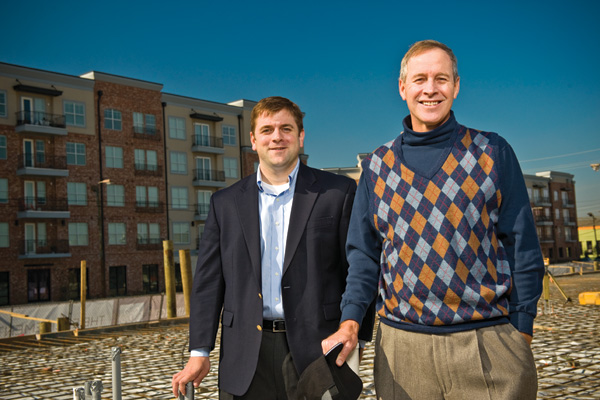
Matt Dearmon (MBA '10), president of the Tulane Entrepreneurs Association, and John Elstrott, executive director of the Levy-Rosenblum Institute for Entrepreneurship, have helped to make the Freeman School's entrepreneurship program one of the top five in the country.
By Mark Miester
In August 2009, New Orleans was the subject of three national articles highlighting a remarkable new spirit of entrepreneurship rising up in the city.
The New York Times reported on the proliferation of so-called entrepreneurial hubs, which seek to foster and support new businesses by clustering like-minded entrepreneurs together. The Wall Street Journal noted the influx of young business people attracted by tax incentives and driven by a sense of social mission.
And in a cover story for Entrepreneur magazine, author Jason Meyers wrote, “Four years after Hurricane Katrina and the many stumbles toward its recovery, these young businesses represent technology, invention and youthful entrepreneurial energy—altogether, the potential for rebirth in a region devastated by disaster.”
Quite a change for the city that care forgot.
“There’s been a change in attitude that was catalyzed by Katrina,” says John Elstrott, clinical professor of entrepreneurship and executive director of the Freeman School’s Levy-Rosenblum Institute for Entrepreneurship. “Everything was up for reinvention—public schools, public health, transportation, housing, infrastructure. When you have that much disruption, that’s where entrepreneurs thrive.”
And that’s also, apparently, where entrepreneurship studies thrive. After years in the shadow of finance and accounting, entrepreneurship has emerged as one of the Freeman School’s hottest programs. In the last five years, the number of students with applications listing entrepreneurship as an interest has grown by more than 10 percent, and membership in the Tulane Entrepreneurs Association, the student organization for prospective entrepreneurs, has nearly tripled. More than 60 students are now active members of the association, a full third of the MBA class.
The program’s growing reputation is also reflected in the rankings. In October 2009, Entrepreneur magazine ranked the Freeman School No. 4 in the nation on its list of the top graduate programs for entrepreneurs, the highest national ranking for any program at Tulane.
The ranking was based on a variety of factors, including the number of students enrolled in entrepreneurship-related courses, the entrepreneurial activity of faculty, the entrepreneurial success of alumni, and the size and quality of the business plan competition, but there was an x factor at play as well: New Orleans.
As the articles in the New York Times, Wall Street Journal and Entrepreneur suggest, New Orleans has become a laboratory for entrepreneurship and social innovation in the wake of Hurricane Katrina, and the Freeman School is playing an active role in that transformation.
“Students have responded to the challenge,” says Elstrott. “They want to come to New Orleans and be part of something, and one way to be part of that is to get into business school and get involved with social entrepreneurship and conscious capitalism.”
If there were any doubt about the role Freeman is playing in the local community, one has to look only as far as last year’s 504ward Business Competition. Sponsored by a local nonprofit, the competition challenged entrepreneurs to come up with business ideas to help retain young professionals in New Orleans. Not only were the first and second place business plans submitted by Freeman School MBA students, but four of the five finalists in the competition were either current Freeman students or recent graduates.
And those students aren’t just devoting their time and energy to New Orleans while they’re in school. Many are staying in the city after they graduate to work with local companies or to start their own businesses.
“I see a definite trend toward students wanting to stay and work in New Orleans,” says Lina Alfieri Stern, director of the Levy-Rosenblum Institute. “There are more opportunities for entrepreneurs now simply because the needs are greater, and students have become disillusioned with the Wall Street career, which used to be the ideal. For the first time in a long time, New Orleans seems like a viable choice.”
“If you were to have asked our class when they first got here if they planned to stay in New Orleans after graduation, most of them probably would have said no,” adds Matt Dearmon (MBA ’10), president of the Tulane Entrepreneurs Association. “That’s completely changed. People fall in love with the city and want to stay, and the Freeman School’s role in helping those people stay is critical.”
Will Donaldson (MBA ’09) is one of those recent graduates who decided to stay in New Orleans and start a business. In June 2009, Donaldson and partners Chris Schultz and Barre Tanguis launched Launch Pad, a business that rents affordable co-working office space to entrepreneurs, freelancers and creative professionals. Located in the Intellectual Property Building, one of the city’s entrepreneurial hubs, Launch Pad charges a flat monthly fee that entitles members to a shared workspace including Wi-Fi, telephone, fax machine, printers, conference space and all the amenities of the I.P. Building.
“I was basing it off the idea that office lease prices were favorable,” says Donaldson. “This was early 2008, right after the real estate crash, so I thought there was a lot of opportunity. It wasn’t necessarily predicated on the fact there would be enormous growth in business.”
As it turns out, Donaldson tapped into a growing market. The original concept was to provide entrepreneurs and would-be entrepreneurs with a more professional alternative to working out of coffee shops, but Donaldson says the networking component has emerged as one of the service’s most valuable features. With entrepreneurs and freelancers with entrepreneurial aspirations working side by side, Launch Pad essentially functions like an entrepreneurial hub within an entrepreneurial hub.
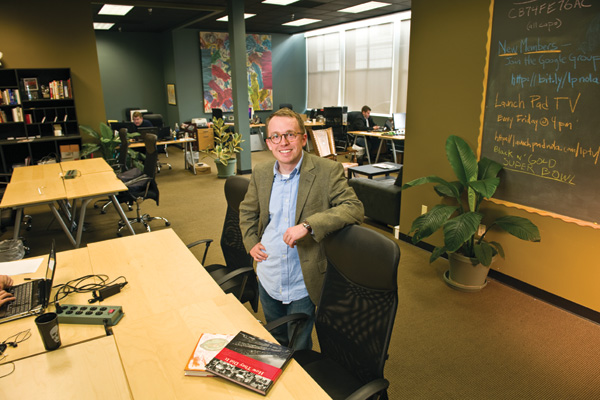
Will Donaldson (MBA '09) co-founded Launch Pad, which rents affordable co-working office space in the I.P. Building to entrepreneurs, freelancers and creative professionals.
“Almost everybody who comes into the office ends up doing business with somebody else in the office,” Donaldson says. “We’re not an incubator. We don’t come in and tell you how to start a business. You just come in and start talking to people because they’re sitting next to you.”
A good example of what Donaldson is referring to is Body Evolution, a startup company that’s commercializing a technology to help individuals overcome body image distortions. After becoming a member of Launch Pad, CEO and co-founder Tom Fischmann ended up hiring two freelancers who were also renting space at Launch Pad.
“Here you have venture capital dollars flowing through a funded startup in our company to freelancers,” says Launch Pad’s Chris Schultz. “Because Tom is in our office, he doesn’t have to hire a lot of employees, because ramping up at a very early stage is extremely risky. At the same time, he gets to pick and choose the best skill sets from freelancers here, and the freelancers are able to justify being out on their own and not having to go get [full-time] jobs.”
Most of the articles on New Orleans’ growing entrepreneurial culture have emphasized the tax credits and other incentives offered to attract businesses to the city, but Donaldson thinks the city’s unique quality of life remains its most valuable incentive.
“I think you can judge the quality of life of a place by the number of people who were not born there that choose to live there,” he says. “I think that’s sort of an interesting factor about New Orleans. You see a lot of expatriates living in New Orleans because it’s just a romantic place to live.”
Currently, Launch Pad is still a part-time project for Donaldson. His full-time job is with Resource Conservation Fund, a private markets investment fund managed by Resource Environmental Solutions, a wetlands mitigation company co-founded by Elstrott. Donaldson says he and Schultz are looking into expanding the Launch Pad concept into other markets, but for the time being he doesn’t have any plans to leave New Orleans.
“I could see myself moving to other parts of the country, but I like New Orleans,” he says. “Even if opportunities take me elsewhere, I think I’ll always maintain a base of operations here.”
Substance or hype?
One of the recurring themes in articles about the city’s new business culture is the phenomenon of entrepreneurial hubs.
Currently, there are at least four such hubs operating in New Orleans. The I.P. Building, home of Launch Pad, hosts businesses including Carrollton Technology Partners, TurboSquid, iSeatz, Couhig Partners and the Idea Village. Entrepreneurs Row, started by developer Sean Cummings, houses businesses including the Receivables Exchange and Free Flow Power. The Icehouse features six businesses in its 7th Ward location, including founding company Trumpet, a branding and business development firm, and Rehage Productions, creators of the annual Voodoo Music Experience. The newest hub is the Entergy Innovation Center, which was started by the Idea Village in the Upper 9th Ward.
There’s just one question. Do entrepreneurial hubs really work?
Ralph Maurer, visiting assistant professor of management, specializes in knowledge creation, and he says the networking opportunities entrepreneurial hubs provide aren’t just helpful for new business development and creation, they’re essential.
“One thing we know about innovation is it tends to come about mainly when you have communities that support rapid exchange of ideas on an informal basis between people,” says Maurer, who teaches the MBA course New Venture Planning. “Where you can encourage a lot of information exchange between academic institutions, industry, entrepreneurs and politicians—where you can get them to mingle quite a bit— that’s when stuff pops up.”
The key, Maurer says, is what scholars refer to as the strength of weak ties.
“You don’t tend to find opportunities with the people you know very well because you pretty much know what they know,” says Maurer. “There’s no new knowledge entering the system. But if all of your strong ties have networks that you have nothing to do with—that you have weak ties to—that’s where knowledge happens. Institutions that are situated as the hub of many different communities can link people, ideas and technologies together in different ways.”
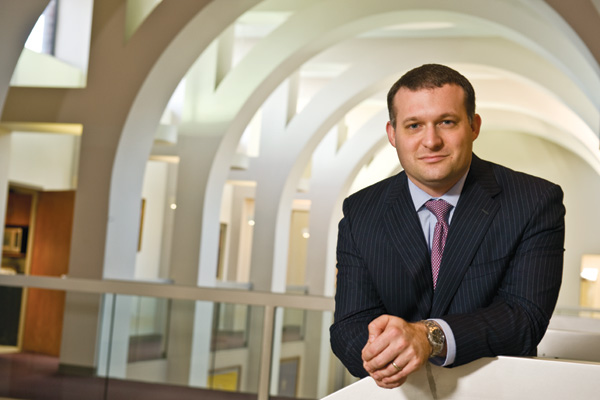
Ralph Maurer, visiting assistant professor of management, says the networking opportunities that entrepreneurial hubs provide are essential to new business creation and development.
Even more important than the co-working and communal spaces that allow entrepreneurs to interact on a daily basis are the meet ups and gatherings hosted by the hubs and other business organizations. Maurer says he’s been impressed by the energy and enthusiasm he’s seen at professional networking events in New Orleans.
“You go to these events and there are scientists with technologies, entrepreneurs with ideas and people with just general knowledge and experience who are piecing things together and who just want to talk about it,” Maurer says. “That’s how ideas ferment and that’s exactly what you want. I see a lot of promise in New Orleans.”
One of the entrepreneurial hubs that Ralph Maurer is most excited about is also one that most people wouldn’t necessarily think of as an entrepreneurial hub.
The New Orleans BioInnovation Center is a technology business incubator created to foster entrepreneurship within the New Orleans bioscience community and help commercialize technologies developed at Tulane, LSU, UNO and Xavier. In October 2009, the center broke ground on a new 65,000-squarefoot facility that will feature wet labs, offices and conference space for lease to researchers and biotechnology companies with university relationships.
You can think of it as an entrepreneurial hub for bioscientists.
“Entrepreneurial hubs are networks to bring individuals with different experiences or education together to network so they can understand each other and potentially do business together,” says Aaron Miscenich (MBA ’91), president of the center. “That’s really what it’s all about.”
In addition to providing space for bioscientists to work and network, the center will also offer programming to help them understand the process of commercialization, including how to deal with angel investors, IP attorneys and companies interested in licensing or buying their technologies. Miscenich’s role is not just to help scientists become entrepreneurs, but also to help keep the companies that grow out of technologies developed at local universities in New Orleans.
“We truly have world-class research going on at Tulane, LSU, Xavier and UNO that no one knows about, but most of that intellectual property—if it makes it to the stage where it can be licensed—leaves town,” Miscenich says. “It’s typically been going to Europe, Philadelphia, Boston or the Research Triangle. What we’re trying to do is provide the resources to commercialize it here in New Orleans, so the jobs and economic value that’s added to the research is done here in the city.”
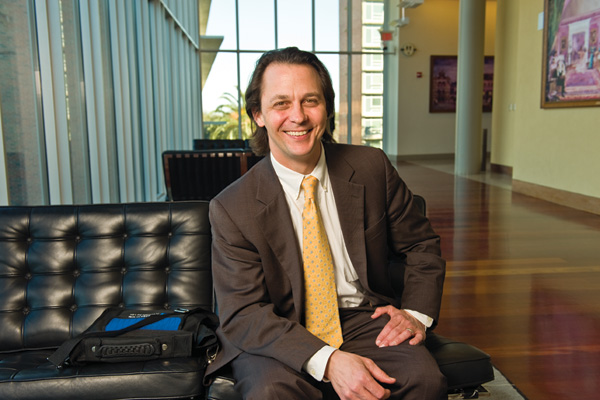
Aaron Miscenich (MBA '91) is president of the New Orleans BioInnovation Center, which helps scientists at Tulane, LSU, Xavier and UNO become entrepreneurs.
While New Orleans has a long way to go to catch up with those locations, Miscenich says the pieces are starting to fall into place. In addition to the BioInnovation Center, the Louisiana Cancer Research Center is currently under construction on Tulane Avenue, representing a $102 million investment in the discovery and development of innovative cancer therapies, and plans are moving forward on a proposed VA/University Medical Center hospital complex, which represents a $2 billion investment in state-of-the-art clinical and research facilities.
“If you look at what the life sciences and the medical community is going to provide to the city over the next three to five years, it’s astounding,” Miscenich says. “And if you think it’s exciting now to be a part of the city, just wait till those hospitals get going and the BioInnovation Center’s up and running. It’s going to be huge.”
Few people have a better perspective on entrepreneurship in New Orleans than Emily Mitchell. As director of technical assistance at the Idea Village, Mitchell oversees the nonprofit’s consulting services to high-potential entrepreneurial ventures like Naked Pizza, which subsequently attracted high-profile investors including Mark Cuban and the Kraft Group, and Feelgoodz, a flip-flop sandals company that uses eco-friendly materials and supports positive social change in Thailand. And as adjunct professor at the Freeman School and instructor in the course Management of New Ventures, she interacts on a daily basis with the next generation of entrepreneurs.
In both areas, Mitchell says she’s seen a remarkable change in attitude about entrepreneurship.
“We’re seeing an empowerment in the entrepreneurial community and a lot more energy around higher growth concepts,” Mitchell says. “New Orleans has become an incubator of innovation and entrepreneurship, and while we’re a smaller community and have less resources than perhaps what you see on the West Coast, there’s a tighter network here and a community invested in supporting entrepreneurs, which you wouldn’t necessarily find in more competitive markets.”
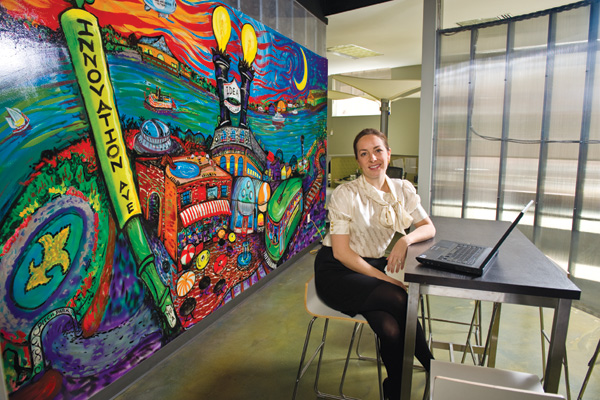
Emily Mitchell (MBA '07), director of technical assistance at the Idea Village and adjunct professor at the Freeman School, says New Orleans has become an incubator of entrepreneurship and innovation since Hurricane Katrina.
The phenomenon of entrepreneurial hubs, Mitchell says, epitomizes that unique spirit of community, support and shared mission among New Orleans entrepreneurs.
“Without these networks, you’re out on your own, which is a really lonely place to be,” Mitchell says. “Working alongside people who have gone through the entrepreneurial process and created successful businesses is not only beneficial in terms of your professional development, but it can also be sort of therapeutic personally.”
While New Orleans is still a far cry from Silicon Valley, Mitchell says the New Orleans entrepreneurial community is nearing a tipping point.
“I think we’ve definitely seen a major shift in how local entrepreneurs approach business, who those entrepreneurs are, and what types of ventures they’re going into,” she says. “We aren’t stuck in hospitality or oil and gas anymore. We’re seeing a lot of innovation, in part coming out of the huge needs that Hurricane Katrina created. Now we’ve got entrepreneurs looking at those problems as opportunities.”
In the wake of Hurricane Katrina, Tulane University introduced a public service requirement for all undergraduates to foster a spirit of civic responsibility. Perhaps unexpectedly, this renewed commitment to civic engagement made Tulane a national destination for students interested in social entrepreneurship.
“The shift toward social innovation across campus is being driven by student demand,” says Stephanie Barksdale. “We may not be ranked in the national top 10, but over and over again, we’re seeing Tulane in a separate category as an engaged, civically minded university. I think we actually rose in the Entrepreneur magazine ranking because we’re perceived as this hidden gem of innovative, socially minded students.”
In 2009, Barksdale joined Tulane to help promote social entrepreneurship initiatives beyond the public service requirement.
While Barksdale oversees social innovation on a university-wide level, she works particularly closely with the Freeman School and the Tulane Entrepreneurs Association to develop programs and opportunities for social entrepreneurs. Last fall, Barksdale helped put Jay Zhao (BSM ’11) in touch with Movers & Changers, the national student social entrepreneurship competition that he and his team ultimately won.
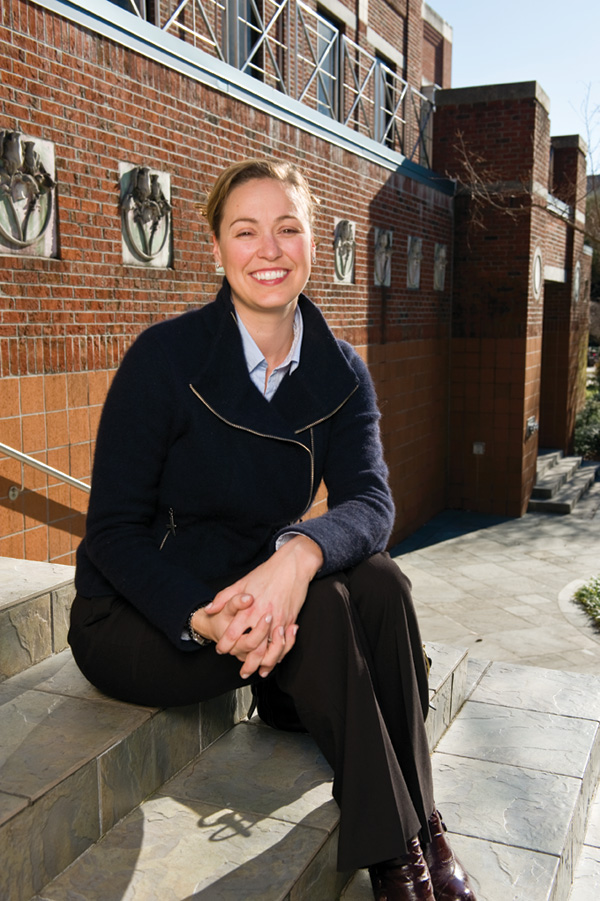
Stephanie Barksdale says Tulane's growing emphasis on social entrepreneurship is being driven by student demand.
This year, Barksdale has partnered with the Tulane Entrepreneurs Association to create a new competition for Tulane-based social entrepreneurs. The NewDay Social Entrepreneurship Challenge will award $20,000 in seed capital to the proposal judged to be the best at effecting social change in New Orleans. The final round of the challenge will take place along with the final round of the Tulane Business Plan Competition, and the application process and timeline of the two competitions were designed to enable eligible social entrepreneurship ventures to enter both competitions.
“The main criteria is that, whatever the plan is, the model must be based on a social mission,” Barksdale says. “Some projects will be for profit, some will be nonprofit, but they have to show a thought process on how they’re going to be financially sustainable.”
While the NewDay Challenge may be a new initiative, Barksdale says it reflects an ongoing spirit of civic engagement and social entrepreneurship among students at Tulane.
“I was hired to help promote social innovation across the university, and I use the word ‘promote’ because it already existed here,” she says. “Our goal is to make this paradigm shift sustainable by spurring opportunities for students to work within the community, live here long term and build careers in New Orleans.”
Freeman has attracted students interested in accounting, finance and energy for years, but Matt Dearmon is part of a new generation who chose the Freeman School specifically for entrepreneurship.
“I talked to people who had gone here and researched it online, and it seemed like it was right up my alley,” Dearmon says. “I was in the process of building a company at the time, and once I learned about the Levy-Rosenblum Institute, the Tulane Entrepreneurs Association and the Tulane Business Plan Competition, I thought what an excellent program.”
Despite his age, Dearmon is already a seasoned entrepreneur. After spending five years in the military after high school, he teamed up with a friend from Ireland to start a gourmet meat business in London.
Later, he used his military background to help develop a plan to offer real estate services to U.S. embassies in the former Soviet Union.
“We saw a huge opportunity to act as the middle man between the Department of State and the local housing market,” Dearmon says. “One person at an embassy is in charge of organizing the housing for the entire embassy staff, so if you have 40 employees, you’re looking at identifying and either acquiring or renting out housing for 40 diplomat and their families at different locations within a given city. The system doesn’t work very well. It’s inefficient and a lot of waste is involved with it, so it really was a win-win situation.”
When he enrolled at the Freeman School, Dearmon knew he wanted to focus on entrepreneurship and he knew he wanted to get involved with the Tulane Entrepreneurs Association, which organizes the annual Tulane Business Plan Competition as well as an entrepreneurial speakers series.
“We’ve had entrepreneurs, venture capitalists and other accomplished professionals come to Freeman to speak and share their experiences with students,” Dearmon says. “It’s an excellent opportunity to network and I think the exposure really helps to tie in concepts from the classroom.”
As for those classroom concepts, Dearmon says high-quality entrepreneurship-related courses in strategy, management, marketing and finance offer prospective entrepreneurs an unbeatable academic foundation.
“One of the reasons we’re so highly ranked in entrepreneurship is the curriculum we have,” Dearmon says. “Those classes really do teach you both corporate strategy and small business strategy, so it provides a valuable skill set for aspiring entrepreneurs.”
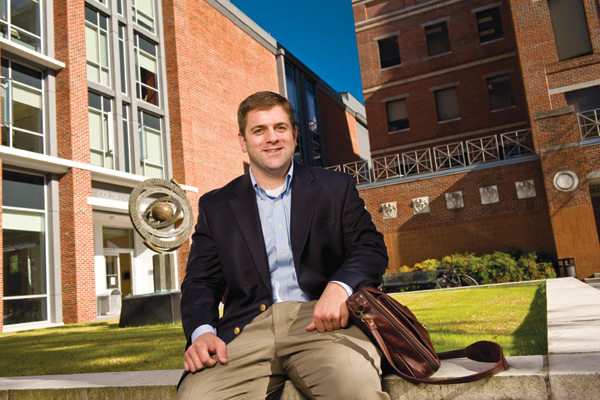
Matt Dearmon says he was attracted to the Freeman School specifically for its entrepreneurship program.
The biggest entrepreneurship event at the Freeman School is the annual Tulane Business Plan Competition. This year’s competition, with a new focus on conscious capitalism, attracted a record 93 entries from countries around the world.
And while most students study entrepreneurship with the goal of one day starting their own businesses, Dearmon says the skills he’s acquired at the Freeman School have applications far beyond startup companies.
“Entrepreneurship education is vital for those looking to start their own business, but it’s also useful for students looking for corporate jobs,” Dearmon says. “Corporations want their employees to think like entrepreneurs on a daily basis. From a strategy perspective, they want problem solvers, and that’s what entrepreneurs are.”
